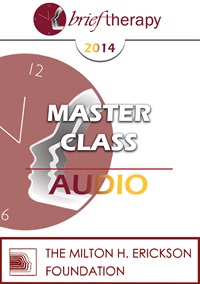
- Average Rating:
- Not yet rated
- Topic Areas:
- Ericksonian Psychotherapy | Master Classes | Brief Therapy | Ericksonian Hypnosis and Therapy Techniques | Experiential Therapy | Psychotherapy | Solution Oriented Approach
- Categories:
- Brief Therapy Conference | Brief Therapy Conference 2014 | Master Class
- Faculty:
- Jeffrey Zeig, PhD | Bill O'Hanlon, MS
- Duration:
- 5:51:06
- Format:
- Audio Only
- Original Program Date:
- Dec 15, 2014
- Short Description:
- Many schools of psychotherapy have been derived from the seminal work of Milton H Erickson M.D., including strategic therapy, interactional therapy, NLP and solution focused therapy. In some approaches hypnosis is central; in other approaches hypnosis is more peripheral. This class features two experts personally trained by Dr. Erickson, each of whom approach psychotherapy from somewhat different perspectives. In his approach, Possibility Therapy, Bill O'Hanlon epitomizes the strengths of a solution focused orientation. In his experiential approach, Jeffrey Zeig shades treatment in the direction of developing dramatic reference experiences.
- Price:
- $15.00 - Base Price
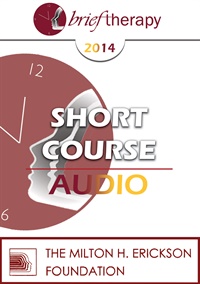
- Average Rating:
- Not yet rated
- Topic Areas:
- Short Courses | Experiential Therapy | Brief Therapy | Meditation, Spirituality and Yoga | Mindfulness
- Categories:
- Brief Therapy Conference | Brief Therapy Conference 2014
- Faculty:
- Susan Pinco, PhD
- Duration:
- 1:34:55
- Format:
- Audio Only
- Original Program Date:
- Dec 11, 2014
- Short Description:
- This experiential seminar will lead attendees in an exploration of mindful silence and its role in the clinical encounter. Our journey will begin with a taste of both structured and unstructured silence followed by a discussion of how both are manifested, experienced, and potentially utilized in the clinical encounter. Research related to silence in psychotherapy and recent findings in neuroscience will help explain why silence is a key ingredient in effective transformational processes.
- Price:
- $15.00 - Base Price
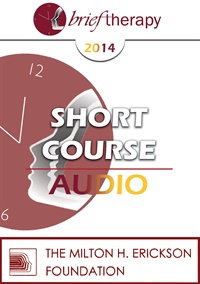
- Average Rating:
- Not yet rated
- Topic Areas:
- Ericksonian Psychotherapy | Psychotherapy | Trauma | Short Courses | Children and Adolescent Therapy | Pain and Healing | Brief Therapy | Ericksonian Hypnosis and Therapy Techniques
- Categories:
- Brief Therapy Conference | Brief Therapy Conference 2014
- Faculty:
- Maria Escalante de Smith, MA
- Duration:
- 1:09:29
- Format:
- Audio Only
- Original Program Date:
- Dec 11, 2014
- Short Description:
- When children experience painful emotions and anxiety after going through traumatic events they may not be able to understand what is happening to them and thus get depressed. Other consequences may appear, like lack of concentration or academic problems. Attendants will learn how treat these conditions by using brief Ericksonian techniques, assignments, and toys and by including the family members during therapy.
- Price:
- $15.00 - Base Price
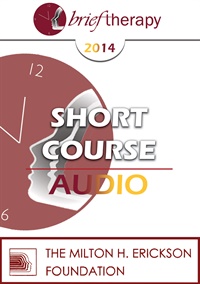
- Average Rating:
- Not yet rated
- Topic Areas:
- Short Courses | Somatic Experiences | Brief Therapy | Ericksonian Hypnosis and Therapy Techniques | Strategic Therapy
- Categories:
- Brief Therapy Conference | Brief Therapy Conference 2014
- Faculty:
- Hank Griffin, MA
- Duration:
- 1:30:29
- Format:
- Audio Only
- Original Program Date:
- Dec 11, 2014
- Short Description:
- Severe mental illness predominantly strikes the young, derailing normal social, cognitive and emotional development, predisposing to traumatic experience. Brief therapy interventions are particularly apt because they encourage skill acquisition and decontextualization via remedial experiential learning. This presentation will detail the use of strategic, somatic experiencing-influenced and Ericksonian interventions, among them pattern interruption, symptom prescription, ordeals and other Ericksonian elements treating chronically ill clients with attention to the structure and delivery of such interventions.
- Price:
- $15.00 - Base Price
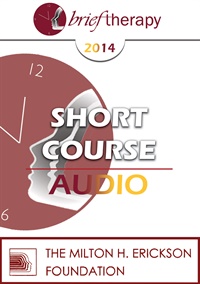
- Average Rating:
- Not yet rated
- Topic Areas:
- Short Courses | Brief Therapy | Neuroscience
- Categories:
- Brief Therapy Conference | Brief Therapy Conference 2014
- Faculty:
- Richard Hill, MBMSc, MEd, MA
- Duration:
- 1:00:54
- Format:
- Audio Only
- Original Program Date:
- Dec 11, 2014
- Short Description:
- Curiosity has long been an important element of therapeutic practice, but neuroscience gives us a deeper understanding and allows for curiosity to be more effectively practiced. New techniques that engage curiosity also act to enhance the client-therapist relationship which we now know is the most important element of successful therapy. Being curious about A Curiosity Approach is exactly what is required to seek out and participate in this workshop.
- Price:
- $15.00 - Base Price
Tags: Brief Therapy Neuroscience
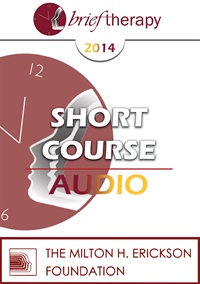
- Average Rating:
- Not yet rated
- Topic Areas:
- Anxiety | Depression | Trauma | Short Courses | Rational Emotive Behavior Therapy (REBT) | Pain and Healing | Brief Therapy
- Categories:
- Brief Therapy Conference | Brief Therapy Conference 2014
- Faculty:
- Debbie Joffe Ellis
- Duration:
- 1:31:16
- Format:
- Audio Only
- Original Program Date:
- Dec 11, 2014
- Short Description:
- Rational Emotive Behavior Therapy (REBT), the holistic approach considered to be the grandparent of cognitive approaches, created by the renowned and brilliant pioneer Albert Ellis PhD, is most effective as a brief therapy for lessening, transforming, healing and preventing emotional disturbances. This Short Course includes a live clinical demonstration, and present the main aspects, methods and techniques of this vigorous, bold and compassionate approach, and is presented by Debbie Joffe Ellis, wife of Albert Ellis.
- Price:
- $15.00 - Base Price
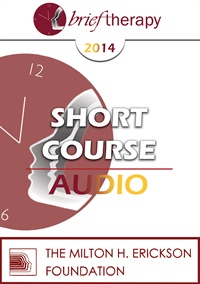
- Average Rating:
- Not yet rated
- Topic Areas:
- Trauma | Short Courses | Experiential Therapy | Brief Therapy | Gestalt | Empty Chair
- Categories:
- Brief Therapy Conference | Brief Therapy Conference 2014
- Faculty:
- Linda Duncan, EdD
- Duration:
- 1:20:41
- Format:
- Audio Only
- Original Program Date:
- Dec 11, 2014
- Short Description:
- This presentation teaches an adaptation of the “empty-chair” that targets trauma. Clients enact a dialogue between the “experiencing” and “self-stifling” parts of the self to discover the true impacts of trauma. Through a structured, step-wise process, clients move from less threatening to more threatening material, eliciting emotions, needs, and desires that have been submerged due to trauma. Supportive neuroscience research explains. Includes demonstration.
- Price:
- $15.00 - Base Price
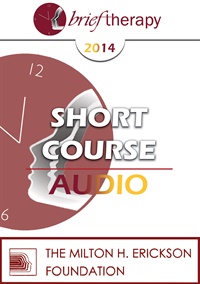
- Average Rating:
- Not yet rated
- Topic Areas:
- Short Courses | Brief Therapy | Couples Therapy | Intimacy | Relationships | Solution Oriented Approach
- Categories:
- Brief Therapy Conference | Brief Therapy Conference 2014
- Faculty:
- Robert Johansen, PhD
- Duration:
- 1:45:02
- Format:
- Audio Only
- Original Program Date:
- Dec 11, 2014
- Short Description:
- The presentation introduces a new, solution-focused model for treating individuals/couples. The model proposes specific and clear steps on how to differentiate types of love and how these impact intimacy. Participants will develop lasting strategies on how to effectively manage personal needs in the context of the intimate relationship.
- Price:
- $15.00 - Base Price
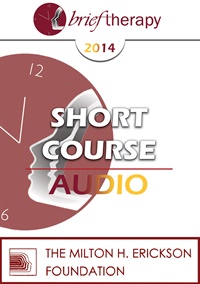
- Average Rating:
- Not yet rated
- Topic Areas:
- Short Courses | Brief Therapy | Strengths-Based | Therapist Development
- Categories:
- Brief Therapy Conference | Brief Therapy Conference 2014
- Faculty:
- Bob Bertolino, PhD
- Duration:
- 1:33:45
- Format:
- Audio Only
- Original Program Date:
- Dec 11, 2014
- Short Description:
- As challenges to well-being increase, practitioners are called to move beyond interventions to improve functioning to those that help clients flourish. Doing so will help clients to exercise greater resilience and do “better than zero.” This session offers strategies to develop gratitude, meaning, and character strengths that foster greater overall well-being.
- Price:
- $15.00 - Base Price
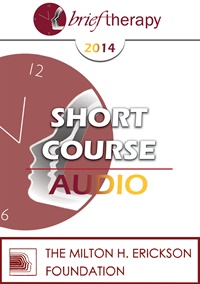
- Average Rating:
- Not yet rated
- Topic Areas:
- Anxiety | Depression | Trauma | Short Courses | Brief Therapy
- Categories:
- Brief Therapy Conference | Brief Therapy Conference 2014
- Faculty:
- Teresa Robles, MA, PhD
- Duration:
- 1:30:29
- Format:
- Audio Only
- Original Program Date:
- Dec 11, 2014
- Short Description:
- After a presentation of original, new conceptualizations on Anxiety, Depression, Trauma and Universal Wisdom, presenter will do an exercise to participants for contacting their Universal Wisdom and to learn how to utilize It. She will demonstrate and participants will practice and discuss exercises and how to teach them to clients.
- Price:
- $15.00 - Base Price
Tags: Anxiety Brief Therapy Depression Trauma
Please wait ...

